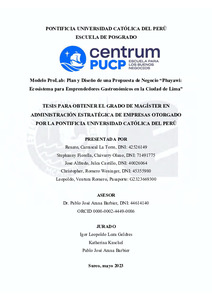| dc.contributor.advisor | Arana Barbier, Pablo José | |
| dc.contributor.author | Carrascal La Torre, Renato | |
| dc.contributor.author | Chávarry Olano, Stephanny Fiorella | |
| dc.contributor.author | Julca Castillo, Jose Alfredo | |
| dc.contributor.author | Romero Weninger, Christopher | |
| dc.contributor.author | Ventura Romero, Leopoldo | |
| dc.date.accessioned | 2023-05-18T15:14:10Z | |
| dc.date.available | 2023-05-18T15:14:10Z | |
| dc.date.created | 2023 | |
| dc.date.issued | 2023-05-18 | |
| dc.identifier.uri | http://hdl.handle.net/20.500.12404/24992 | |
| dc.description.abstract | En estos últimos años, el país ha sido golpeado por sucesos de orden sanitario, político y
social que afectaron su economía, lo que impulsó a muchos a buscar nuevas alternativas de
desarrollo, entre los que sobresale la evolución del comercio electrónico por delivery. El
sector gastronómico es uno de los que mayor impulso ha dado a esta tendencia, por ello,
muchos empresarios y emprendedores que ingresan a este rubro enfocan sus negocios a este
canal de atención, buscando aprovechar el crecimiento exponencial que se viene observando
y así capitalizar la oportunidad de negocio, el desarrollo de su marca y mitigar el riesgo
financiero. Este proyecto plantea una propuesta que beneficia al emprendedor gastronómico
en el proceso del lanzamiento y puesta en marcha de sus negocios. La idea consiste en ofrecer
un ecosistema gastronómico basado en el alquiler de cocinas ocultas (dark kitchen) y un
servicio de laboratorio de marcas digitales, que brindará una alternativa para desarrollar su
emprendimiento bajo un sistema controlado y reduciendo el riesgo inherente a todo
emprendimiento.
En términos de viabilidad, se considera que el proyecto tiene potencial de escalabilidad y de
valor compartido, pues permitirá reducir la tasa de fracaso de los emprendedores que
contraten los servicios. El VAN financiero que genera el proyecto es de S/. 3’756,902.85, con
una inversión de S/. 1’276,439, una TIR financiera 109.35% y un recupero de las inversiones
al segundo año, finalmente el VAN social arrojó un valor de S/. 4’396,756 lo que demuestra
que el proyecto también es socialmente viable. | es_ES |
| dc.description.abstract | In recent years, the country has been hit by health, political and social events that affected its
economy, which prompted to seek new development alternatives, among which the evolution
of the e-commerce by delivery. The gastronomy sector is one of the sectors that has given the
greatest impetus to this trend, for this reason, many businessmen and entrepreneurs who enter
this area raise their businesses on this service channel, seeking to take advantage of the
exponential growth that has been observed and therefore capitalize on the business
opportunity, developing their brands and mitigating financial risk. This project presents a
proposal that benefits the gastronomic entrepreneur in the process of launching and starting
up their businesses. The idea is to offer a gastronomic ecosystem based on the rental of ghost
kitchens (dark kitchen) and a digital brand laboratory service, that will provide an alternative
to develop your venture under a controlled system and reducing the risk of the venture.
In terms of feasibility, it is considered that the project has scalability potential and shared
value, since it will reduce the failure rate of entrepreneurs who hire our services. The
financial VAN generated by the project is S/. 3’756,902.85 with an investment of
S/.1’276,439, an IRR of 109.35%, and a recovery of the investments in the second year,
finally the VAN social yielded a value of S/. 4’159,228 which shows that the project is also
socially viable. | es_ES |
| dc.language.iso | spa | es_ES |
| dc.publisher | Pontificia Universidad Católica del Perú | es_ES |
| dc.rights | info:eu-repo/semantics/closedAccess | es_ES |
| dc.subject | Negocios--Planificación | es_ES |
| dc.subject | Emprendimiento--Perú | es_ES |
| dc.subject | Gastronomía--Perú--Lima | es_ES |
| dc.subject | Comercio electrónico--Perú | es_ES |
| dc.title | Modelo prolab: Plan y diseño de una propuesta de negocio “Phayawi: ecosistema para emprendedores gastronómicos en la ciudad de Lima” | es_ES |
| dc.type | info:eu-repo/semantics/masterThesis | es_ES |
| thesis.degree.name | Maestro en Administración Estratégica de Empresas | es_ES |
| thesis.degree.level | Maestría | es_ES |
| thesis.degree.grantor | Pontificia Universidad Católica del Perú. CENTRUM | es_ES |
| thesis.degree.discipline | Administración Estratégica de Empresas | es_ES |
| renati.advisor.dni | 44614140 | |
| renati.advisor.orcid | https://orcid.org/0000-0002-4449-0086 | es_ES |
| renati.author.dni | 42526149 | |
| renati.author.dni | 71491775 | |
| renati.author.dni | 40026064 | |
| renati.author.dni | 45355980 | |
| renati.author.pasaporte | G2323669300 | |
| renati.discipline | 413307 | es_ES |
| renati.juror | Igor Leopoldo Loza Geldres | es_ES |
| renati.juror | Katherina Veronica Maria Kuschel Rietzsch | es_ES |
| renati.juror | Pablo José Arana Barbier | es_ES |
| renati.level | https://purl.org/pe-repo/renati/level#maestro | es_ES |
| renati.type | https://purl.org/pe-repo/renati/type#tesis | es_ES |
| dc.publisher.country | PE | es_ES |
| dc.subject.ocde | https://purl.org/pe-repo/ocde/ford#5.02.04 | es_ES |






